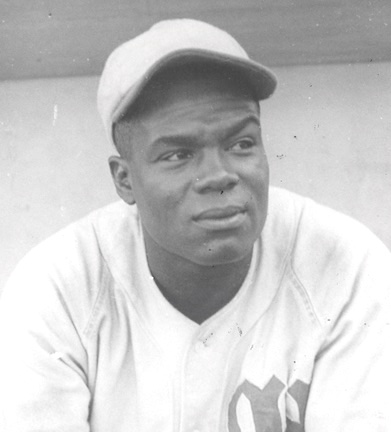
Sport: Baseball
Born: Mat 23, 1918
Died: December 7, 1980
Town: East Orange, New Jersey
Leonard Curtis Peterson was born May 23, 1918 in Akron, Ohio, and grew up in East Orange, NJ, after his family moved to the Garden State in the 1920s. Tall, well-muscled and super-competitive, Lennie was a standout in football, basketball and baseball. His first taste of organized sports came when he was recruited by Pat Wilson, a promoter who fielded a team of African-American teenagers in Paterson called the Smart Sets. Larry Doby and Monte Irvin were teammates of Lennie’s. He and Irvin later formed the pitcher-catcher battery for East Orange High until Lennie ruined his right arm playing football. This prompted a move to first base. In the years that followed, Lennie would also play the outfield and third base before settling in permanently at first.
Lennie left school before graduation to play pro ball—first with the Triangles, a local semipro team and then briefly with the St. Louis Stars, who were unable to pay their players. Lennie returned to New Jersey and began his career with the Newark Eagles, who were owned by Abe and Effa Manley. Lennie began to flash his power in his 20s. During that time, he also struck up a friends-with-benefits relationship with Effa, who arranged off-season employment for Lennie with the Edison Company and also intervened on his behalf with the local draft board when World War II started.
Lennie played the outfield in his first few seasons for Newark, while learning the ins and outs of first from veteran Mule Suttles. When Ray Dandridge signed to play in the Mexican League in 1941, Lennie played third for a season and opened a lot of eyes. That earned him his first East-West All-Star nod—one of six in his career. The following season, Lennie was anointed the team’s everyday first baseman and won the Negro National League triple crown, with 11 homers, 56 RBIs and a .347 average in 52 league games.
Like many Negro Leaguers, Lennie spent his winters playing in the Caribbean. In 1941 and 1942, he played in Puerto Rico and was one of the circuit’s leading hitters. Occasionally, however, he stayed home to pursue his second passion, basketball. He played on the front line for the powerhouse New York Rens and locally with his old club, the Orange Triangles. In 1945, the Rens competed in the World Tournament of Professional Basketball in Chicago and made it to the semifinals before falling to the eventual champion Ft. Wayne Pistons. Lennie averaged 3 points a game as the team’s back-up to high-scoring Hank DeZonie. Lennie also barnstormed with the Satchel Paige All-Stars and, later, the Jackie Robinson All-Stars to earn extra cash.
Lennie repeated as the NNL RBI leader in 1946, with 61 in 60 official games, as well as a league-best 18 stolen bases. His name was constantly in the headlines that summer. In late August, the Eagles played the Homestead Grays and New York Cubans in the same day. Lennie homered in both games to spearhead a pair of victories in the heat of a pennant race. Lennie’s power stroke also produced three homers in four games played against the New York Black Yankees in Yankee Stadium that year—no small feat given the stadium’s commodious left field. The ’46 Eagles had an awesome collection of talent that included Irvin, Doby, Max Manning and Leon Day. They defeated Satchel Paige and the Kansas City Monarchs in the last great Negro League World Series that September. Lennie torched KC pitching in the series for a .393 average.
That winter, Lennie began a historic run with Havana when he led the Cuban League in RBIs for the first of three consecutive seasons. He played his fourth and final year in Cuba in 1950–51 with Havana’s arch rivals, Almendares.
The Manleys sold the Eagles after the 1948 season and Lennie spent 1949 as player-manager of the Baltimore Elite Giants. In 1950, he signed a minor-league deal with the Milwaukee Brewers, then a farm team of the Braves. More than a dozen of his teammates would find work in the majors, including George Crowe, whom Lennie knew from his basketball adventures, But not Lennie. Though he hit .300 for the Brewers, he was already in his 30s and, after a couple more seasons in the minors, he retired to Newark to run a bar he owned, the Club 111 Lounge, and later Len Pearson’s. Effa Manley reportedly fronted him the money to start his business.
Lennie passed away in 1980 at the age of 62.